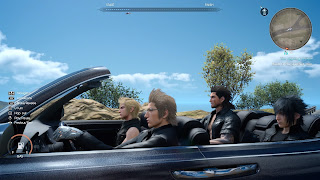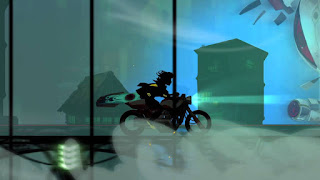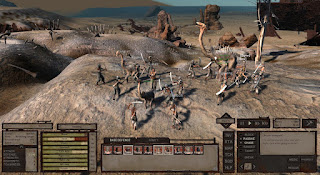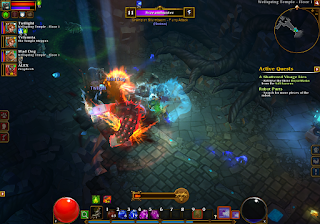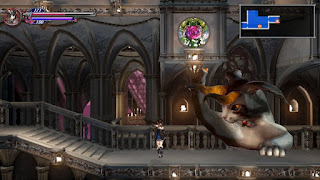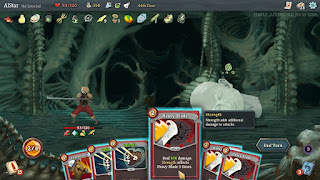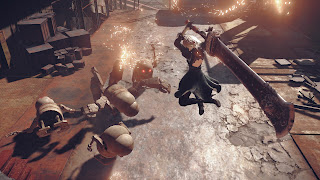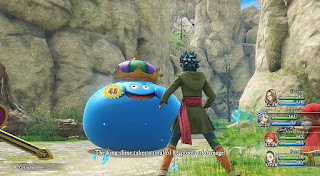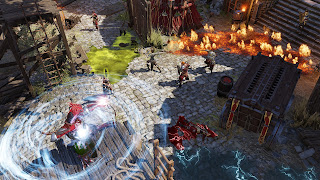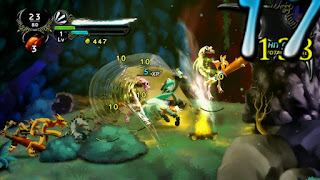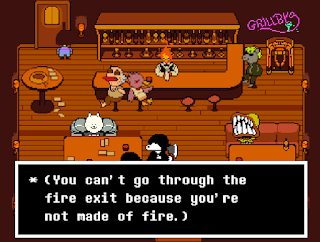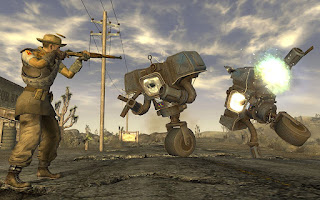Same rules as the last three lists: Only one game per series, and it still has to be fun today.
HM. The Legend of Zelda: Breath of the Wild (Nintendo, Wii U/Switch)
Breath of the Wild marks Nintendo's first foray into open world gaming, and while it doesn't go off flawlessly, they certainly put forth a valiant effort to make it a unique take on the format. The game shows an incredible level of polish in its overall design, with a very solid physics engine, clever (though somewhat shallow) cooking/crafting mechanics and some intense combat thanks to the revamped mechanics and more aggressive enemy AI. The player is also not locked into completing puzzles in one "intended" way - they're given most of their tools right out of the gate and told to use them however and whenever they see fit to get their current objectives done. Yes, there's emergent gameplay in a Nintendo game; I never thought I'd see that happen. Of course, the Zelda staples of incredible setpieces, creatively-crafted dungeons and enormous boss encounters remain, but Breath of the Wild puts a unique spin on nearly every element of the franchise, and for that alone it deserves some respect.
21. Final Fantasy XV: Royal Edition (Square Enix, 2016/2018)
Final Fantasy XV is a game with a famously long and troubled production, beginning nearly a decade before as a Final Fantasy XIII tie-in before eventually becoming its own thing, and even the trailers showed quite a lot of scenes that were ultimately trimmed down or cut entirely from the final version. It's still a somewhat rough experience in its final form too, with uneven design quality, some chapters being extremely linear and others having more of an open-world feel, letting you explore, complete quests and partake of minigames at your leisure. However, the glue that holds it all together its strong writing - the characters in XV are honestly some of the best-written the series has ever had, with some very memorable interactions and a chemistry that was largely absent in prior entries. The journey they're all on is a very personal one, and the way they overcome the trials before them and grow close to become unshakable friends and allies is honestly really inspiring, making it one of my favorites in the series from a writing perspective. Even the villain is a great one, with a relatable motive and a destiny he's desperately trying to rebel against in the most destructive way he can. That, plus some astonishing visuals and incredible music, make it an unforgettable journey in spite of its gameplay not being the greatest (though it is substantially improved in the Royal Edition, so play that version if you can).
20. Kingdom Hearts: Birth By Sleep Final Mix (Square Enix, 2010/2017)
19. Ni no Kuni II: Revenant Kingdom (Level-5, 2018)
The original Ni no Kuni, while an enjoyable title that presented the story tropes, fun characters and gorgeous animation of a good Studio Ghibli title in the world of gaming, was hampered by rather generic design and some lackluster party AI. Ni no Kuni II, on the other hand, goes in the opposite direction - while the characters and story are overall rather stock, the gameplay is much more polished, bringing back Level-5's usual item crafting mechanics and semi-randomized dungeons to add longevity. It actually feels a bit like a Suikoden game in some respects too, as a large part of the experience is spent building one's kingdom and finding new recruits for their army, as well as taking place in large-scale skirmishes across the landscape. Basically, Revenant Kingdom is a blend of Ghibli, Suikoden and Dark Cloud, and while it's not amazing at being any of those things, it proved to be so fun and addictive that I didn't mind in the slightest. Level-5 is once again playing to their strengths, and that's a good thing no matter how you cut it.
The original Ni no Kuni, while an enjoyable title that presented the story tropes, fun characters and gorgeous animation of a good Studio Ghibli title in the world of gaming, was hampered by rather generic design and some lackluster party AI. Ni no Kuni II, on the other hand, goes in the opposite direction - while the characters and story are overall rather stock, the gameplay is much more polished, bringing back Level-5's usual item crafting mechanics and semi-randomized dungeons to add longevity. It actually feels a bit like a Suikoden game in some respects too, as a large part of the experience is spent building one's kingdom and finding new recruits for their army, as well as taking place in large-scale skirmishes across the landscape. Basically, Revenant Kingdom is a blend of Ghibli, Suikoden and Dark Cloud, and while it's not amazing at being any of those things, it proved to be so fun and addictive that I didn't mind in the slightest. Level-5 is once again playing to their strengths, and that's a good thing no matter how you cut it.
18. Transistor (Supergiant Games, 2014)
A slick, stylish and efficiently designed little game that melds real-time action with the ability to pause time and plan out sequences of actions in advance to efficiently destroy enemies and avoid their attacks. Throughout you also gain Functions that triple as attack sills, augments for others attack skills or passive buffs; pretty creative way to get you to experiment with different combinations and tweak your playstyle. Of course, Supergiant's gift for unique narration plays in too, with the mostly-silent protagonist Red and her talking sword slowly piecing together the events of the story and talking it out in one-sided conversation. Easily my favorite Supergiant game of the 2010's.
17. Kenshi (Lo-Fi Games, 2018)
A game that was in development for a whopping twelve years before its release, but the effort paid off as it ended up being a fun and unique experience. While somewhat reminiscent of games like Elder Scrolls with its open-ended exploration and granular character building, its interface is more akin to a real-time strategy game - you recruit characters, assign them into squads, and give them various tasks to whatever end you wish - building up your base, mining resources, growing food, or engaging in battle with hordes of bandits and monsters. There is an interesting backdrop and plenty of bizarre lore to uncover, but no set storyline - you're just dropped off and left to your own devices, able to become a paladin for the Holy Nation, a sword-for-hire, a warlord looking to overthrow the kingdoms, or whatever else you wish. Characters can (and frequently will) lose limbs, you can be captured by slavers and have to make a daring escape, and all sorts of freakish monsters and factions are out to get you, and facing them is the only way to get stronger; training in camp will only get you so far. It may be a bit too slow-paced and grindy for some, but Kenshi is a compelling, complex and boldly unique game with layers of depth that only the PC platform could provide.
16. Torchlight II (Runic Games, 2012)
The original Torchlight was a pretty fun take on the Diablo format (from several of the devs who worked on that franchise, no less), but its long-term enjoyment factor was hampered by a lack of online co-op. Torchlight II addresses that and so much more, becoming one of the best action-RPGs of all time in the process. There are four new classes to play with now and numerous way to customize them to your liking, each character gets separate loot drops (negating the need to argue over who gets what after felling bosses), and some other great conveniences are added too - you can send your pet back to town to sell off junk items and even bring back potions for you to keep the action flowing, and you can even recover gems from item slots (by destroying the item) or do just the opposite, destroying the item to get your gems back. A ton of great mods exist as well, adding new classes, areas and rebalanced gameplay to the mix, and you can even play online with friends using them (though you have to be sure to sync up all the mods you have installed first). Just an amazingly fun experience all the way through.
15. Valkyria Chronicles 4 (Sega/Media.Vision, 2018)
Valkyria Chronicles was easily one of the previous generation's best tactical RPGs, but it kinda got the shaft after its first entry. The second game (on the PSP) was lackluster overall and sold poorly, 3 got passed up entirely for localization as a result, and well, the less said of that lousy action spinoff game, the better. Almost ten years after the series debuted, Valkyria 4 brought back what made made it a hit in the first place - wonderful storytelling, polished design and a well-realized story with some amazingly written characters, high stakes and great plot turns. A couple new twists are added in the form of a new class called Grenadiers (who can fire mortar rounds at long distances) and the Brave system, which allows an injured character a chance to turn the tide back on their opponent by boosting an ally or getting to finish a turn before they're incapacitated. Another excellent wartime tale in Europa.
Valkyria Chronicles was easily one of the previous generation's best tactical RPGs, but it kinda got the shaft after its first entry. The second game (on the PSP) was lackluster overall and sold poorly, 3 got passed up entirely for localization as a result, and well, the less said of that lousy action spinoff game, the better. Almost ten years after the series debuted, Valkyria 4 brought back what made made it a hit in the first place - wonderful storytelling, polished design and a well-realized story with some amazingly written characters, high stakes and great plot turns. A couple new twists are added in the form of a new class called Grenadiers (who can fire mortar rounds at long distances) and the Brave system, which allows an injured character a chance to turn the tide back on their opponent by boosting an ally or getting to finish a turn before they're incapacitated. Another excellent wartime tale in Europa.
14. Bloodstained: Ritual of the Night (Artplay, 2019)
Konami used the 2010s to torpedo just about all of their popular IPs, so Koji Igarashi seized an opportunity to capitalize on fan demand and announced a spiritual successor to the Castlevania format with Bloodstained. It had a somewhat troubled road to release, with some announced ports (Vita and Linux) being canned and the release of a buggy demo to backers getting people very skeptical, but I'm glad to say that the end result was a very satisfying one. With another large castle to explore, being able to customize your character with shards (similar to the Soul system from Aria of Sorrow) and a pretty well-realized crafting system, Bloodstained provides the depth and polished feel of a high quality Metroidvania. Iga brought back the format he helped to popularize in fine fashion.
13. Shadowrun: Dragonfall/Hong Kong (Harebrained Schemes, 2014/2015)
Shadowrun on SNES was a cult classic, taking an open-ended CRPG style of design and releasing it on a console with surprisingly good results. Harebrained Studios created a followup to that style of design years later with Shadowrun Returns, though the series really came into its own with two sequels - Dragonfall and Hong Kong. Both games really play up the grim setting, setting up some wonderfully crafted mysteries and blending in the franchise's dark fantasy and cyberpunk elements in fine fashion, giving you numerous ways to complete objectives. Even its playable characters are delightfully complex, fitting in some levity with their own grim tales and twisted humor, which makes taking the journey with them all the more fun.
12. Ys VIII: Lacrimosa of Dana (Nihon Falcom, 2016)
The ninth (non-remake) entry in the Ys series is easily its most ambitious yet, presenting the series in HD for the first time and upping the ante for its presentation with fully rendered cutscenes and voice acting for the story. The gameplay retains many elements of its later entries (particularly Seven and Celceta) as well, though it also adds in a new twist by having you build a whole settlement for your crew as you band together and attempt to escape the island. Replete with minigames, sidequests and of course the same great action and kickin' soundtrack that made the series a hit in the first place, Ys VIII is a standout title, as well as a fantastic throwback to what made JRPGs great in the first place. You know, strong gameplay, great storylines, memorable characters and overall polished design, not weak gimmicks and masturbation.
11. Prey (Arkane Studios, 2017)
The immersive sim genre is one I've come to absolutely adore, and sadly well-made ones are one of the scarcest genres these days; you usually either get something that's dumbed down to the point of inanity (Bioshock) or broken piles of garbage that are just made to cash in on name recognition with no thought spared for actual quality (Underworld Ascendant). But even the good ones have an uphill battle when it comes to selling well, ensuring that most companies that make them get too scared to attempt another. So, imagine my surprise when Arkane Studios would actually make a damn good example of the genre years after their first attempt (Arx Fatalis) nearly bankrupted them. With a creative setup, open-ended design that lets you approach problems and solve them in any number of inventive ways, enemies that are genuinely dangerous and require quite a bit of thought and planning to overcome, creative mechanics (recycling junk items into useful stuff - quite fun) and even some pretty impressive engine effects (I like the faux-3D spaces in the "Looking Glasses" - nice reference, by the way), Prey is a damn fine experience.
(And because I know it'll come up - yes, I'm aware of the controversy with it having the same name as the 2006 Prey, but no direct connection to that game's story or scenario. Bethesda bought the IP from Human Head and and Arkane basically tossed all of HH's finished work on Prey 2 to make their own game instead while still using the same name. That doesn't mean 2017 Prey is a bad game, though.)
10. Slay the Spire (Megacrit, 2019)
A turn-based deck building roguelike with all the trappings both of those genres entail - picking a character, fine-tuning your deck from random assortments of cards earned after battle, collecting artifacts to bolster your abilities, and dealing with all manner of random events, both positive and negative. It's got a heavy luck element to it as all Roguelikes do, but being able to improvise, adapt and overcome will of course serve you brilliantly. And of course, the ability to unlock all sorts of new cards, characters and install player created mods add plenty of replay value on top of an already amazingly deep base game.
9. NieR: Automata (PlatinumGames/Square Enix, 2017)
Yoko Taro was always known for writing some emotionally heavy and downright bizarre games, but they were almost always accompanied by gameplay that was mediocre at best, relegating them to cult classic status. Automata got PlatinumGames on board, though, and the gameplay saw a massive improvement, providing the same fast-paced, intense action that quickly became their hallmark. So now you get a game that's great on both fronts - a grim, strange and oddly compelling storytelling experience (compounded by some brilliant acting throughout) and some surprisingly strong gameplay to back it up. A fantastic soundtrack too. Basically, a total package for a must-play experience.8. Shantae: Half-Genie Hero (WayForward, 2016)
Shantae is another series that got a new lease on life in recent years, with a string of highly-acclaimed sequels starting in 2008 with Risky's Revenge. Half-Genie Hero is the one that really drew me to it, though, taking the charming characters and colorful world of Sequin Land and really bringing them to life with some brilliant 2D animation; some of the best I've ever seen, in fact. The gameplay was somewhat reworked from earlier games, though - rather than being an open world Zelda-styled adventure, it opted for a stage-based format a la Mega Man X, with the player having to return and replay stages to unlock secrets later on once they got new forms and powerups to try out. However, the tight design, fantastic presentation and some unique twists on the gameplay (including getting to play as Shantae's friends for the first time through DLC) made it a standout game, and still my favorite to date in the series.
7. Dragon Quest XI S: Echoes of an Elusive Age Definitive Edition (Square Enix, 2019)
Dragon Quest XI was a game that had a lot of hope pinned on it, as Square Enix was unimpressed with sales for DQ games in the west and any future localization efforts would hinge on how well XI sold. However, it ended up doing quite well, as while its core gameplay remains relatively unchanged from all the others across the series' 30-year history, the sheer amount of polish in its design, the charming writing and the A+ presentation won it a lot of fans regardless. This only got better with the Definitive Edition, which added in tons of postgame content, an orchestral score that sounds utterly fantastic and even some added challenges for those that felt the base game was too easy, giving even the most die-hard gamers plenty to enjoy. Dragon Quest is a franchise that remains unapologetically old-school at its core, but also stands as proof that you can add in quality-of-life improvements, high-quality graphics and gorgeous music atop that and still keep the appeal intact.
6. Divinity: Original Sin II (Larian Studios, 2017)
5. XCOM 2 (Firaxis Games, 2016)
XCOM is a classic franchise, melding elements of business sims, turn-based strategy and granular character building together in fine fashion. The 2012 remake was pretty good, though it felt a bit shallow in comparison to the original classic for DOS. 2016's XCOM 2, however, is a brilliant new turn for the series and probably my favorite overall. Set in a grim future where XCOM was defeated relatively early in the war and the aliens have successfully integrated themselves into human life, you (as XCOM's old commander) are freed from captivity and set out on a guerilla campaign to expose their evildoings and reclaim the earth before it's too late. It really does feel like an uphill battle too, as you're constantly having to deal with limited resources, facing dangerous threats with underequipped units (particularly early on) and having to constantly weigh your options, deciding which of several choices (all of which you really want) will benefit you more in the long run. Just getting your foot in and managing to turn things around is a challenge in itself, let alone stopping the aliens in the long run, but it's that glimmer of hope against all odds that keeps you playing. The PC version is even more brilliant, with a plethora of mods that add new classes, mission types and other fun stuff to the game.
4. Dust: An Elysian Tail (Humble Hearts, 2012)
I always love a good indie success story, and for my money, Dust: An Elysian Tail is one of the best ever told. Self-funded and developed, animated and designed by a single person over a period of three-and-a-half years, the end result is a gorgeously-animated metroidvania with combat that feels like a lighter version of Devil May Cry, letting you launch and juggle enemies with combinations of sword strikes and spells to rack up damage and get bonus experience points. Don't be fooled by the cute Disney-esque aesthetic, though, as it's a surprisingly grim and dark story, facing themes of genocide, loss and coming to terms with one's own sins, all told with surprisingly good writing and voiceover. Proof that talented indies are, and always were, where the true heart of gaming is to be found.
3. Persona 4 Golden (Atlus, 2012)
Persona 3 was a pretty innovative game for the time, reinventing the Persona franchise as a creative blend of life/school sim and dungeon crawling RPG and letting you improve your characters' abilities as you helped them grow as people - a pretty great concept. Persona 4 took the idea even further, letting your characters' improvements carry over into battle (allowing them to block attacks, learn new moves and even powering up their personas at max level). Golden only took the concept further, adding in many new scenes, more social links and some creative new battle mechanics, creating the definitive version of the concept and, for my money at least, the best Persona game to date.
2. Undertale (Toby Fox, 2015)
1. Fallout: New Vegas (Obsidian, 2010)
Fallout's revival was met with a lot of skepticism from long-time fans, myself included, and while I think Fallout 3 was still a pretty good game, it just lacked the punch, wit and sense of freedom that made the Interplay/Black Isle games so memorable. New Vegas saw much of the original development team return, and sure enough, they did right by the franchise they pioneered, bringing back the vast amount of depth and sharp humor that made Fallout so great. Centered in the Mojave during a complex battle between the NCR, Caesar's Legion and one Mr. House all looking to cement control over the region, the player is dropped into the middle of the war and given the freedom to shape its outcome however they wish, aligning with any of the three factions (or none at all) and working their way to becoming a legend of the wasteland. It is admittedly hampered a bit by the creaky, aging Gamebryo engine (and even after numerous patches, it's still pretty buggy), but I was having too much fun exploring the dense Fallout universe to care. A brilliant experience that only gets more fun every time I play it, and easily one of my favorite games of all time.

